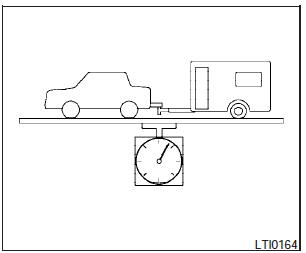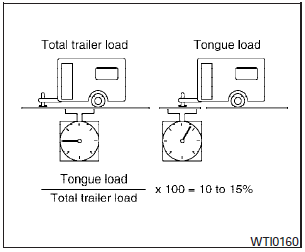Maximum load limits
Maximum trailer loads
Never allow the total trailer load to exceed the value specified in the Towing Load/Specification chart found later in this section.
The total trailer load equals trailer weight plus its cargo weight.
- When towing a trailer load of 1,000 lbs.
(454 kg) or more, trailers with a brake system must be used.

The Gross Combined Weight Rating (GCWR) equals the combined weight of the towing vehicle (including passengers and cargo) plus the total trailer load. Towing loads greater than these or using improper towing equipment could adversely affect vehicle handling, braking and performance.
The ability of your vehicle to tow a trailer is not only related to the maximum trailer loads, but also the places you plan to tow. Tow weights appropriate for level highway driving may have to be reduced for low traction situations (for example, on slippery boat ramps).
Temperature conditions also can affect towing.
For example, towing a heavy trailer in high outside temperatures on graded roads can affect engine performance and cause overheating. The transmission high fluid temperature protection mode, which helps reduce the chance of transmission damage, could activate and automatically decrease engine power. Under some conditions, engine and vehicle speed could be reduced. Plan your trip carefully to account for trailer and vehicle load, weather, and road conditions.
WARNING:
Overheating can result in reduced engine power and lower vehicle speed. Also, when the high temperature mode operates, engine and vehicle speed may be gradually reduced. On highways, the reduced speed may be lower than other traffic which could increase the chance of a collision. Be especially careful when driving.
If the vehicle cannot maintain a safe driving speed, pull to the side of the road in a safe area and allow the engine to cool or the transmission to return to normal operation. See If your vehicle overheats in the In case of emergency section of this manual.
CAUTION:
Vehicle damage resulting from improper towing procedures is not covered by NISSAN warranties.

Tongue load
Keep the tongue load between 10 - 15 percent of the total trailer load or use the trailer tongue load specified by the trailer manufacturer. The tongue load must be within the maximum tongue load limits shown in the following Towing Load/Specification chart. If the tongue load becomes excessive, rearrange cargo to allow for proper tongue load.
See also:
Battery replacement
Be careful not to allow children to swallow
the battery or removed parts. ...
Troubleshooting guide
The system should respond correctly to all voice
commands without difficulty. If problems are encountered,
try the following solutions.
Where the solutions are listed by number, try
each soluti ...
Tire rotation
NISSAN recommends rotating the tires
every 7,500 miles (12,000 km).
See “Flat tire” in the “In case of emergency”
section of this manual for tire replacing
procedures.
As soon as possib ...
